|
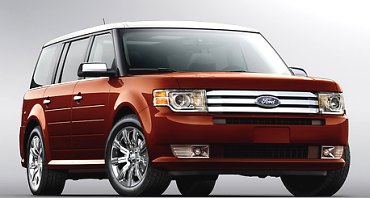
|
European has MAV for long, now
American has their own version of MAV...
|
The
theory behind Ford Flex is very simple. Forget those silly descriptions
like “Flex is a crossover between car and crossover” or “it represents
a new type of vehicles on the market” etc. Think in this way: European
has family hatch-based multi-activity vehicles. American demand things
much larger, so their version of MAV is built on a full-size sedan
platform (Ford Taurus / Lincoln MKS), has its wheelbase stretched for
130 mm and bodyshell squared up to accommodate 6 people in 3 rows.
This concept is nothing special. In fact, Chrysler has been using it
(unsuccessfully) in its Pacifica since 2003. The key difference here is
design. The long and square profile of Flex could have given us an
impression of a funeral car or a household refrigerator, but through
elegant detailing and fine surface treatment, Ford’s designers
miraculously turned it into a tasteful and fashionable design. This is
even more successful than Toyota bB Mk1, the ancestor of refrigerator
school.
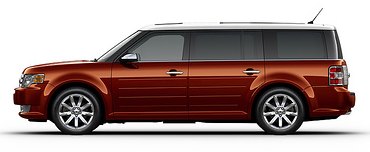
|
A funeral car, Mini Clubman XXL or
Range Rover ? Its looks like all.
|
On the road, Ford Flex looks like a
premium MPV. There is
strong flavors of Range Rover in its front end design, the way its
bonnet clamps onto the grille and its blackened window pillars. On the
other hand, the general body profile and white roof make it look like a
Mini Clubman XXL, if that car ever exist. Not many other Fords worth
comparison with those design icons.
The cabin of Flex is also tastefully styled. But the best news to us is
the vast improvement of material quality, which compares well with the
best European and Japanese luxury minivans. You can have a lot of
comfort and entertainment features, such as refrigerator, DVD video
system, Sync audio / phone connection etc., but they will cost you a
lot of extra money. What comes standard is a flexible seating
arrangement, after which the “Flex” is named. You can fold all
passenger seats independently to place luggage. Like Chrysler Pacifica,
Ford opts for a 2+2+2 theatre-style seating to please the second row
passengers. Benefited from an extra wide and tall bodyshell, each of
the passenger enjoy vast of head, leg and shoulder room. Even the third
row is decent for average size adults, something most other minivans
failed to achieve. Admittedly, this is a must for a car measuring over
5.1 meters long and weighing in excess of 2 tons.
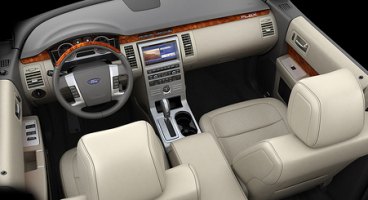
|
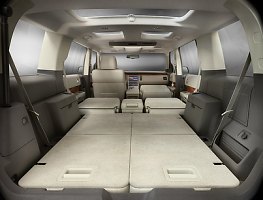
|
A flexible cabin is where "Flex" named
after
|
As we have mentioned, Flex is built on
the Taurus / Taurus X
platform. Front-wheel drive is its inherent design, while part-time 4WD
system is optional. Suspensions are MacPherson struts up front and
multi-link setup at the rear. However, the rear suspensions have
reworked geometry (different locations of springs and dampers) and a
thicker anti-roll bar to deliver more refined ride. This is necessary
because Flex employs pretty firm springs to counter body roll.
On the road, it handles better than its 1.7-meter height suggested.
Body roll is well suppressed. Ride is firm but well controlled.
Steering is more eager than most minivans. However, don’t ever try to
drive it like a Ford S-Max. No cars at this size and weight could
completely deceive the laws of physics.
Even on the straight you will beg for more power. The only engine
available at launch is the familiar 3.5-liter DOHC V6, which pumps out
263 horsepower and mates with a GM-Ford 6-speed automatic gearbox
without any manual facility. It takes around 9 seconds to go from zero
to sixty yet drinks a lot of fuel. Blame to that heavyweight body, even
the mildest enthusiastic drive will need to thrash the engine to upper
rev, where the Ford V6 is not renowned for refinement.
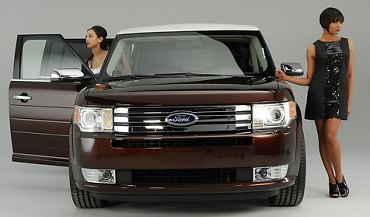
|
Body roll is less than its 1.7-meter
height suggested...
|
In these days, developing a jumbo-size
car is not too wise.
However, we cannot deny that Ford is very brave this time. Can the Flex
overcome the rising fuel price and raw material costs and make money
for Ford ? I am not sure. But compare with conventional minivans it is
undoubtedly more fun and more desirable. It could be a nice replacement
to minivans. |